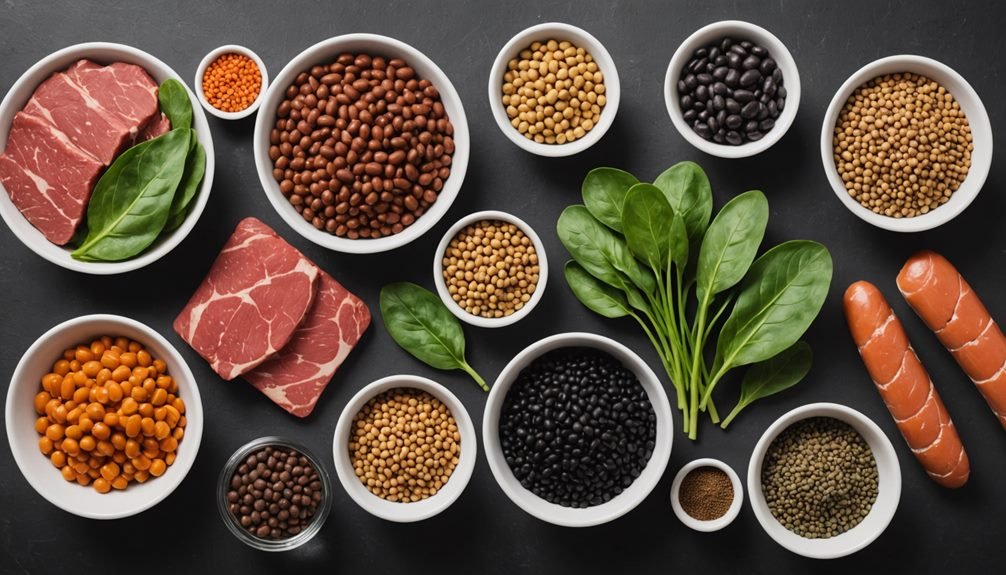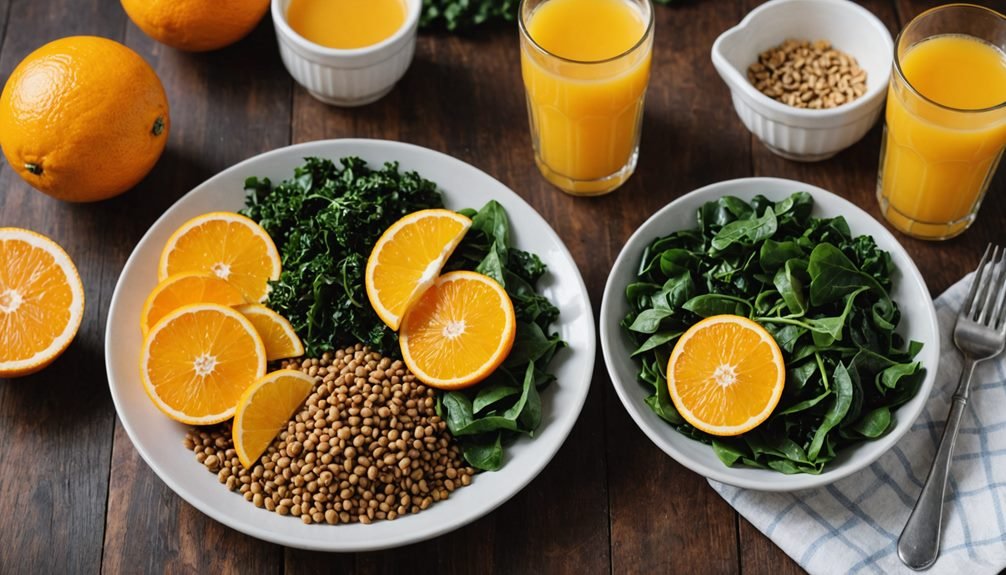"Cherishing Little Steps - A Haven for Baby and Family Journeys"
How to Rebuild Your Iron Levels Post-Birth
After giving birth, your body undergoes significant changes that may lead to decreased iron levels. Ensuring your iron stores are replenished is crucial for your well-being. Discovering the most effective ways to boost your iron post-birth can make a substantial difference in your recovery journey. By incorporating certain foods and making simple lifestyle adjustments, you can pave the way for a healthier and more energized postpartum period.
Importance of Iron Post-Birth

Understanding the importance of iron post-birth is crucial for new mothers as they navigate the recovery period after giving birth. Iron deficiency is common during pregnancy and childbirth due to the increased demand on the body. Postpartum recovery is a delicate time where mothers need to replenish their iron stores to combat fatigue and support overall health.
Iron plays a vital role in the production of red blood cells, which are essential for oxygen transport throughout the body. Without an adequate supply of iron, new mothers may experience symptoms such as weakness, dizziness, and difficulty concentrating.
During the postpartum period, it's essential to monitor iron levels and address any deficiencies promptly. Incorporating iron-rich foods into your diet and, if necessary, taking supplements can help restore optimal levels. Consulting with a healthcare provider is recommended to determine the best approach for managing iron deficiency during postpartum recovery.
Iron-Rich Foods to Include
To support your body's recovery post-birth and replenish essential nutrients like iron, incorporating iron-rich foods into your diet is paramount. Opting for plant-based sources of iron can be beneficial in boosting your levels. Foods such as lentils, chickpeas, tofu, spinach, and quinoa are excellent choices. Pairing these plant-based sources with foods high in vitamin C, like citrus fruits or bell peppers, can enhance iron absorption.
Additionally, protein pairings can further assist in maximizing iron absorption. Combining iron-rich foods with protein sources like lean meats, fish, poultry, or beans can aid in the body's utilization of iron.
For example, having a spinach salad with grilled chicken or lentil soup with a side of quinoa can be delicious and nutritious ways to increase your iron intake.
Effective Iron Supplements

After incorporating iron-rich foods into your diet to replenish essential nutrients post-birth, you may consider adding effective iron supplements to further support your body's recovery. Iron supplements come in various forms, including tablets, capsules, and liquid. If you find it challenging to meet your iron needs through diet alone, supplements can be a valuable addition.
When choosing an iron supplement, consider factors such as the type of iron used, dosage, and any additional nutrients included to enhance absorption. Some individuals may require a higher dosage, especially if they've undergone significant blood loss during childbirth.
In cases of severe iron deficiency, an iron infusion may be recommended by your healthcare provider for a faster replenishment of iron levels.
Remember that while supplements can be beneficial, they should complement dietary changes rather than replace them entirely. Always consult with your healthcare provider before starting any new supplement regimen to ensure it's suitable for your specific needs post-birth.
Cooking Tips for Iron Absorption
To optimize iron absorption from your meals, it's essential to implement effective cooking techniques that enhance the bioavailability of this vital mineral in your diet. Here are some practical tips to help you make the most of your meals:
- Meal planning: Incorporate iron-rich foods like lean meats, poultry, fish, legumes, and dark leafy greens into your weekly meal plan to ensure a consistent intake of this essential nutrient.
- Recipe modification: Enhance iron absorption by pairing plant-based iron sources with vitamin C-rich foods like citrus fruits, bell peppers, or tomatoes in your recipes. This combination can significantly boost the absorption of non-heme iron.
- Avoid excessive heat: Overcooking foods can degrade the iron content. Opt for gentler cooking methods like steaming or sautéing to retain more of the iron in your ingredients.
- Cast iron cooking: Consider using cast iron cookware for preparing meals, as it can increase the iron content of your food, especially when cooking acidic dishes like tomato-based sauces.
Hydration and Iron Levels

Maximizing your iron levels post-birth involves considering not only the foods you consume but also your hydration habits. Water intake plays a crucial role in maintaining adequate hydration levels, which are essential for optimal iron absorption. Dehydration can hinder the body's ability to absorb nutrients efficiently, including iron.
It's important to ensure you're drinking enough water throughout the day to support your hydration levels and facilitate the transport of iron in your body.
Maintaining proper hydration levels can also help prevent common issues like constipation, which can further impact iron absorption. Aim to drink at least eight to ten glasses of water daily, especially if you're breastfeeding.
Staying hydrated won't only benefit your overall health but also support your efforts to rebuild your iron levels post-birth.
Lifestyle Changes for Iron Boost
During the post-birth period, incorporating lifestyle changes can significantly boost your iron levels and support your overall well-being. Here are some practical tips to help you enhance your iron levels:
- Regular Exercise: Engaging in physical activity can increase your body's ability to absorb iron from the diet, ultimately aiding in replenishing iron stores.
- Balanced Diet: Consuming iron-rich foods such as lean meats, leafy greens, and legumes can assist in meeting your daily iron requirements.
- Adequate Sleep: Prioritize a consistent sleep schedule as sleep patterns play a crucial role in the body's iron metabolism and overall health.
- Stress Management: High stress levels can impact iron absorption negatively, so incorporating stress-reducing activities like mindfulness or yoga can be beneficial for iron levels.
Managing Iron With Vitamin C

When it comes to managing your iron levels, incorporating vitamin C into your diet can play a crucial role in enhancing iron absorption. Vitamin C benefits iron absorption by helping convert iron into a form that's more easily absorbed by your body. Including vitamin C-rich foods such as oranges, strawberries, bell peppers, and tomatoes in your meals can significantly improve your body's ability to absorb iron from plant-based sources or supplements.
Timing iron intake with vitamin C is also essential for maximizing iron absorption. Consuming iron-rich foods or supplements alongside vitamin C-containing foods or beverages can boost the amount of iron your body absorbs.
For example, pairing a spinach salad with strawberries or drinking a glass of orange juice with your iron supplement can help you get the most out of your iron intake.
Iron Depleting Foods to Avoid
To maintain healthy iron levels, it's important to be mindful of the foods that can deplete your body's iron stores. Here are some items to avoid:
- Coffee and Tea: These beverages contain compounds that can hinder iron absorption. Try to consume them between meals rather than with iron-rich foods.
- Calcium-Rich Foods: Foods like dairy products can inhibit iron absorption. Consider spacing out your intake of calcium-rich foods from iron-rich meals.
- Whole Grains and Legumes: While whole grains and legumes are healthy, they also contain phytates that can reduce iron absorption. To mitigate this, try soaking or fermenting them before consumption.
- Highly Processed Foods: Processed foods often lack essential nutrients like iron and may contain substances that interfere with iron absorption. Opt for whole, nutrient-dense foods instead.
Regular Iron Level Check-ups

Regular monitoring of your iron levels is crucial for maintaining overall health and preventing complications related to iron deficiency. Iron deficiency can lead to fatigue, weakness, and other health issues, especially post-birth when your body is in a recovery phase. The most effective way to keep track of your iron levels is through regular blood tests. These tests will provide valuable information about the status of your iron stores and help determine if any interventions are necessary to boost your levels.
Blood tests are essential tools for assessing your iron status accurately. They measure important markers like serum ferritin, transferrin saturation, and hemoglobin levels, giving you a comprehensive picture of your iron levels.
By monitoring these levels regularly, you and your healthcare provider can identify any fluctuations or deficiencies promptly and take appropriate actions to address them.
Make sure to schedule routine check-ups to monitor your iron levels closely, especially in the months following childbirth. By staying proactive and vigilant about your iron status, you can support your overall well-being and speed up the recovery process.
Consultation With Healthcare Provider
Consider scheduling a consultation with your healthcare provider to discuss your iron levels post-birth. It's essential to seek medical advice during your postpartum recovery to ensure your iron levels are adequately replenished.
Here are four key points to keep in mind during your consultation:
- Review Your Current Iron Levels: Your healthcare provider will assess your current iron levels through blood tests to determine the extent of any deficiency.
- Discuss Iron-Rich Foods and Supplements: Your provider can recommend specific dietary changes or supplements to help boost your iron levels effectively.
- Understand Potential Symptoms: Your healthcare provider can explain the signs of low iron levels, such as fatigue, weakness, and dizziness, to watch out for during your postpartum recovery.
- Follow-Up Plan: Establish a follow-up plan with your provider to monitor your progress and make any necessary adjustments to your iron supplementation regimen.
Frequently Asked Questions
Can I Take Iron Supplements on an Empty Stomach?
Yes, you can take iron supplements on an empty stomach. However, it's advisable to consult with your healthcare provider to determine the best timing for your iron supplement intake. Fasting and iron may impact absorption, so consider taking your supplement with a source of vitamin C to enhance absorption.
Finding the right routine for iron supplement timing can help ensure you're getting the most benefits from your supplement regimen.
How Soon After Birth Should I Start Focusing on Iron Levels?
After giving birth, focus on your iron levels early for a healthy recovery. Add iron-rich foods like lean meats, beans, and dark leafy greens to your diet. Postpartum recovery is vital, and iron plays a key role in replenishing your body's stores. Start incorporating these foods as soon as possible to support your health and well-being during this crucial time. Remember, your body needs time and nourishment to heal properly.
Are There Any Natural Ways to Increase Iron Absorption?
To boost iron absorption naturally, focus on dietary changes like consuming vitamin C-rich foods with iron sources.
Cooking techniques like using cast iron cookware can also help.
Herbal remedies like nettle or yellow dock can aid in iron absorption.
Lifestyle modifications such as avoiding tea or coffee with meals can enhance absorption.
Incorporating these strategies can support your body in increasing iron levels efficiently and naturally.
Can I Drink Coffee or Tea With Iron-Rich Foods?
You shouldn't drink coffee or tea with iron-rich foods if you want to boost iron absorption. Caffeine consumption, found in coffee and tea, can hinder your body's ability to absorb iron effectively.
Tea intake can also interfere with iron levels due to compounds that inhibit absorption. To optimize your iron absorption, it's best to avoid consuming these beverages alongside iron-rich meals or supplements.
Prioritize your iron intake by avoiding caffeine during these times.
Is It Safe to Take Iron Supplements With Other Medications?
It's important to be cautious when taking iron supplements with other medications. Certain drugs can interact with iron supplements, affecting their absorption or effectiveness. Always consult your healthcare provider before combining different medications with iron supplements to ensure safety and effectiveness.
Your provider can provide personalized guidance based on your specific health needs and medication regimen. Prioritize communication with your healthcare team to avoid any potential interactions that may impact your iron levels.
Conclusion
To effectively replenish iron levels post-birth, include iron-rich foods, consider supplements under guidance, cook to retain iron, stay hydrated, manage stress, and monitor levels regularly. Remember, incorporating these practices and seeking support from healthcare providers are essential in promoting your overall well-being and recovery. Stay proactive, stay informed, and stay healthy for yourself and your little one.




